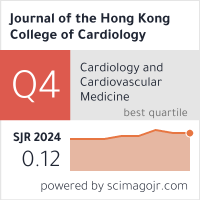Abstract
Background
Complex, high-risk and indicated PCI with impaired left ventricular function remains a challenge. The Impella device offers hemodynamic support during HR-PCI to maintain organ perfusion. There are trials and registries on experience with Caucasians. However, Asian data have been limited.
Methods
In this single-centre, retrospective and observational registry, 38 patients underwent elective or urgent HR-PCI with the Impella® CP between June 2018 and June 2023 in Tuen Mun Hospital. Primary feasibility end points were successful device implantation, freedom from unstable ventricular arrhythmia and cardiac arrest. Primary safety end points were 30-day mortality and MACCE. Secondary safety end points were wound infection, vascular complication requiring surgery, access site bleeding and hemolysis with blood transfusion. Changes in NYHA class III and IV symptoms, LVEF, eGFR and SYNTAX I score following revascularization were also explored.
Results
All patient underwent successful device implantation. One patient experienced ventricular arrhythmia that required defibrillation and cardiac arrest, another patient required intraoperative CPR. Cumulative 30-day mortality was 7.9% and MACCE was 21.1%. One patient developed Impella-related wound infection, and the rate of vascular complication requiring surgery was 7.9%. Moreover, 10.5% and 5.3% received blood transfusion due to access site bleeding and hemolysis respectively. There were significant improvements in NYHA class III and IV symptoms, LVEF and SYNTAX I score after revascularization, while eGFR remained similar before and after HR-PCI.
Conclusion
Data from this local registry provided information on outcomes of HR-PCI in the Asian population, while also supporting safety, feasibility and potential usefulness of Impella-assisted HR-PCI.
Recommended Citation
Karen Pui Shan Shek, Jonathan Gabriel Sung, Ling Ling Ip, Ho Lam, Ping Wa Yam, A single-centre registry in Impella-supported high-risk percutaneous coronary intervention — our 5 year experience Journal of the Hong Kong College of Cardiology 2024;31(4) https://doi.org/10.55503/2790-6744.1537
Creative Commons License

This work is licensed under a Creative Commons Attribution-Noncommercial-No Derivative Works 4.0 License.



